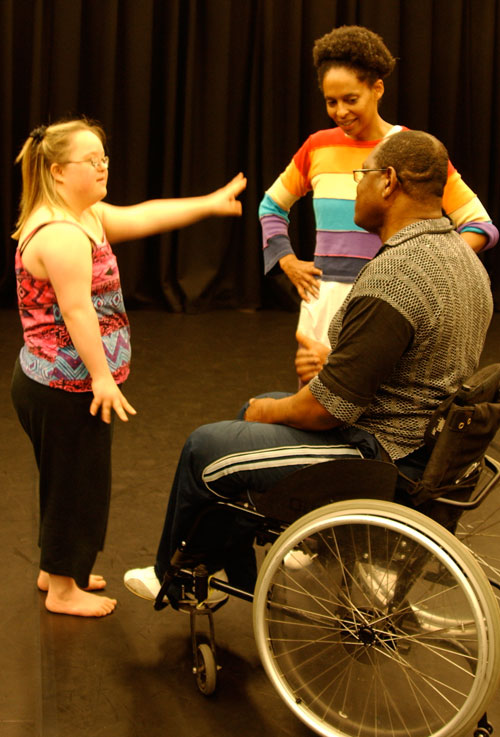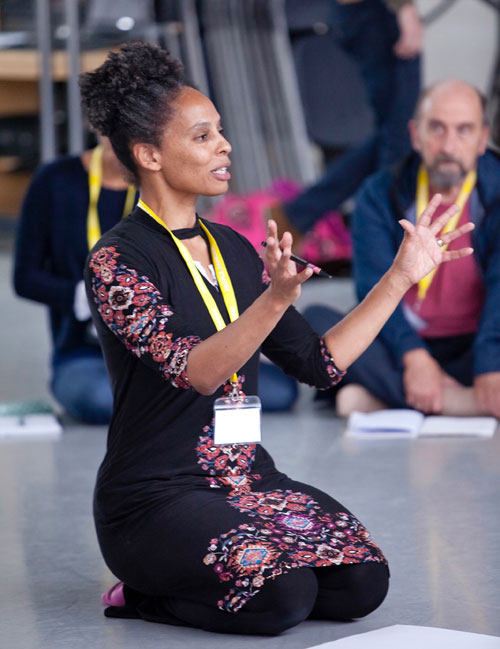Blessed with a September birthday, raised as the child of teachers and parent to two primary schoolers (despite the fact I graduated over 25 years ago) this time of year will always feel to me like a time of new beginnings.
It’s also the time of year, we at People Dancing, and I, in my own practice, as a mentor, am most frequently, sometimes fearfully, asked about practitioners new beginnings as teachers - especially if they are fresh out of training and feeling the Autumn chill of this thing called ‘working life’.

Suzi Miller, Louise Katerega, Tom St Louis, rehearsal for 'One Night Only'. Photographer: Karen Harvey.
The question often starts “How do I know…
…where to start?"
…what’s legal and safe?"
…how much to charge?"
And, as a mentor, I love those questions, because they speak so much to me of the asker’s desire to give of their best. It tells me that this person, whatever their level of experience, knows it is our business, in every sense of that word, as dance practitioners, to embrace the mechanisms which protect everyone, and everything involved in the dance equation – buildings, bodies, collaborators and us!
And to those who apologise to me for somehow not knowing all this, my response is: “You may not have even started yet, but I’m already happy to take your class!” In other words, I value your desire to get it right, because it is the beginning of doing so! For me, it sends a message, not of ignorance, but of integrity. What you need is a place to start looking - so here you go!
So how DO you know? Well one answer is to turn to us!
Below are 10 links to our information and resources, to answer that question: How do I know how to….
1…get insurance, and what sort of insurance do I need?
You may need your own insurance. If you are a member of People Dancing you can access more information and advice on the Fact sheets and legal compliance information page.
2…get a DBS (Disclosure and Barring Service) check?
Particularly if you plan to work with children, young people and/or vulnerable adults, many clients will request this certification, which replaced the CRB (Criminal Records Bureau) check in 2012.
3…conduct a risk assessment?
Risk assessments benefit everyone. They are a useful planning tool creating trust between employer and employee and an anchor should anything go wrong. As a member of People Dancing you can access our Risk assessment online learning course which will help guide you through what you need to know and do.
4…get a music license for use in performances and classes?
For more information and advice on how to navigate this world and find out what you need, as a member of People Dancing, you can download the Copyright Information sheet.
5…find suitable music for the classes I teach?
One of People Dancing’s best kept secrets! Check out our playlists compiled by experienced practitioners suitable across and for specific dance styles.
6…negotiate my fees?
A genuine challenge for practitioners at any stage of their career. Personally, I have gained the most confidence through my communications training with Rivca Rubin and in conversation with other artists. Find out how to budget and work out your costs using People Dancing’s Developing income streams for participatory arts practice online learning programme.
7…declare my earnings as a self-employed person?
It has never been easier to get information online about how to register as self-employed, submit your tax returns step-by-step and keep your records in order. (Believe me. I remember the old days and the reams of paper and endless confusion!)
8…have the confidence that my skills are good enough?
This is a big one and slightly different territory. It comes up a lot in conversations People Dancing have with emerging teachers. For me, being able to prove my membership of a professional body such as People Dancing is a big help with confidence. However, if you are having a really serious bout of imposter syndrome, then here's a quick inspiring read from a young Animated magazine contributor, Emily-Rose Cluderay, that shows you that even in a crisis continuing to teach can help you through.
9…keep 'growing' my career?
By learning more and earning more! Find out how the National Occupational Standards (NOS) for Dance Leadership, developed by People Dancing, can provide a useful check-list for dance artists so that they can reflect on their practice and consider the range of skills they need to develop in order to be most effective across the course of their career.
10…stay connected?
Most importantly, how do I know how to stay connected with a professional community of people like myself? Gathering information is important, but… as so many People Dancing member events tell us, it’s only when you share it in real life, among others with comparable experiences, that it really starts to make sense!
So, stay in touch and don’t feel you are on your own.
As for my perspective, from the other end of a teaching career, the writer Albert Camus said “Autumn is a second spring. When every leaf is a flower”. I feel similar about all the new teachers, of all ages and backgrounds, that I’ve seen pass my way. It’s all about how you see yourself. You might feel what you bring is ‘just’ the first building block. It is. And it is what it is for now. And entirely enough to begin your career!
In my experience, the people in your classes are generally capable of seeing your work as a positive experience. They want you to do well - they are a warm audience and will support you.
I wish you the courage to believe that all in your garden is already lovely and will bear rich fruit in time with patience, support and experience.

People Dancing's International Conference, Glasgow. Photographer: Rachel Cherry.